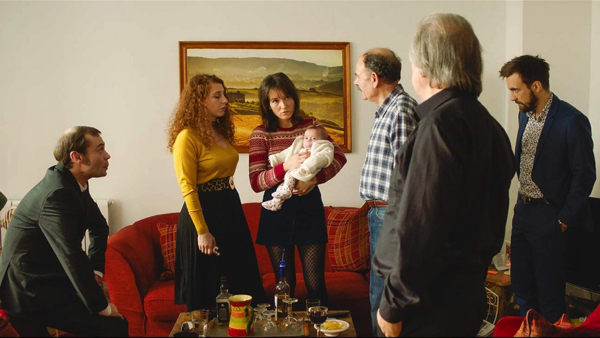
Dir. Robert Guédiguian. France/Italy. 2019. 107mins
Veteran director Robert Guédiguian knows his audience, his cast and muse: he makes politically aware films about ordinary working class people facing crisis in his native Marseille. The Last Mitterand and The Army of Crime are exceptions but his domestic dramas are consistently appealing to a certain type of viewer. In Gloria Mundi he jazzes things up a bit with some cinematic flourishes and a script that goes down and dirty but it is largely predictable in a solid, decently crafted sort of way.
Gloria Mundi belongs to Gérard Meylan’s Daniel, a likeable and grounded dark horse who has done time in Rennes for killing a man in self-defence. We meet him in the mellow autumn of his life, content with his own company and happy to have found a certain modus vivendi as he wiles away his post-prison days writing Haiku poetry and contemplating a soulmate who – conveniently – lives only in his dreams. He was once married to Ariane Ascaride’s salt of the earth night cleaner Sylvie who went on to enjoy a more enduring relationship with bus driver Richard, an equally mellow Jean-Pierre Darroussin, who took on her daughter Mathilda (Anais Demoustier). The couple then had Aurore (Lola Naymark) who runs a shop with Bruno (Grégoire Leprince-Ringuet). Mathilda is seen giving birth to the titular Gloria as the film opens.
The appealing thing about this Midi-set drama is the way these ordinary people have come to accept their lives without rancor or resort to bitterness or despair. There is something of the Emile Zola’s about these characters: Life is tough for them but they put their backs in to earning their living, never shirking or relying on criminality to bring home the bacon. Guédiguian, like Zola, is interested in temperament here rather than character, and he tells his story straightforwardly without any gimmicks or flashbacks. Marseille is very much a character too, its stunning skyline and maritime feel suffusing the drama with a certain charm that diehard fans will find comforting, although others might consider it all a bit pedestrian. The plot is nonetheless satisfying and well thought out, reaching a surprising conclusion and avoiding the ubiquitous and nebulous enigma that it so commonplace nowadays in place of a solid – if minor – narrative.
The family fortunes take a turn for the worse after little Gloria is born. Mathilda and her husband Nicolas (Robinson Stévenin) have invested in a shiny black limousine so he can work as an Uber driver, while she goes back to helping in a clothes shop. But Nicolas has his arm broken by thieves who steal the car, and Richard is suspended from his job after the police catch him on the ‘phone while driving a bus.
Daniel then shows his true colours stepping out of the shadows to support his estranged daughter Mathilda and reconnect with Sylvie who has refused to strike with her co-worker at the cleaners’ union, and is looking after Gloria while holding down her punishing nocturnal schedule. Meanwhile, Aurore and Bruno are about to open their second shop and are enjoying a raunchy sex life fantasising about a three-some with Mathilda, who Bruno is already sleeping with, unbeknownst to Aurore and Nicolas, who is slowly losing the plot, sitting at home with a broken arm.
Guédiguian often feels like the French version of Mike Leigh and Ken Loach. And here again he crafts a tale of domestic dynamics showing how economic setback can rapidly put a strain on family life. He did this first with his best known work Snows of Kilimanjaro and more recently with The House by the Sea. This is a less subtle affair that triumphs because of its engaging story of Marseillaise life and its quality performance all set to an unobtrusive Ravel score. MT
VENICE FILM FESTIVAL | 2019 | Best Actress Ariane Ascaride